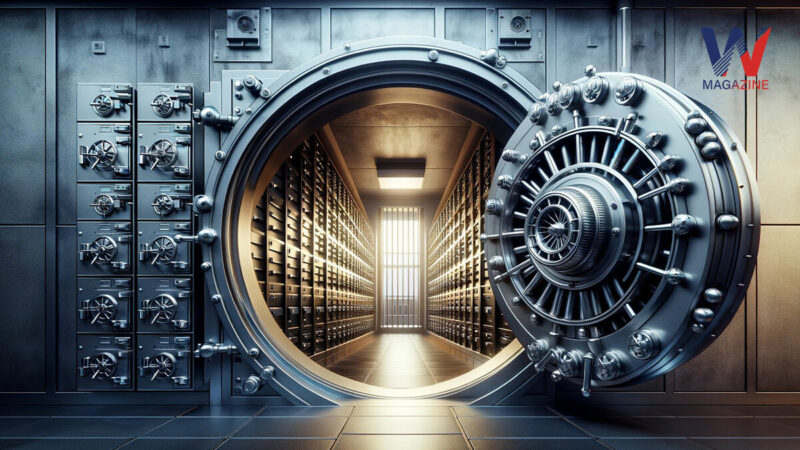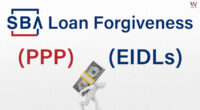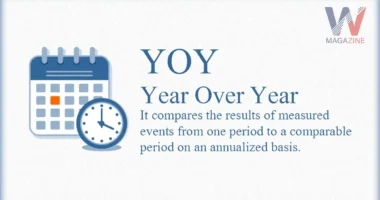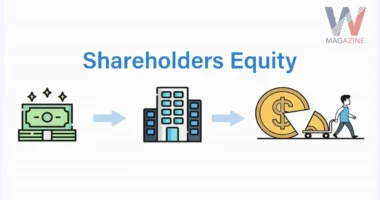Table of Contents
What is Safe Deposit Box?
A safe deposit box is a locked metal container that you may rent from a bank or credit union. These boxes are kept in a bank’s safe or vault, which is a specially protected area. People use these boxes to store valuable items, critical papers and personal treasures. The idea is to keep these belongings safe using the security features of the bank or vault.
Key Points
- Safe deposit boxes are built to survive natural disasters like fires, floods, hurricanes and tornadoes.
- Never keep the only copy of an essential document in a safe deposit box.
- Safe deposit boxes are great for those who prefer not to keep important items digitally.
- It’s a good idea to share access to your safe deposit box with someone else, known as a co-lessor.
How Safe Deposit Boxes Operate?

When you rent a safe deposit box from bank, you’ll be given a key. To open your box, you’ll use this key along with a second key held by a bank employee. If the bank has a keyless system, you might use a fingerprint or hand scan instead. Regardless of the system, you’ll need to show some ID and your key. This process goes on each time you want to access the box.
You can rent a box just for yourself or add other people to the lease as co-lessors, who will then have the same access and rights to the box contents. It’s important to choose co-lessors wisely, especially if they have issues that could affect their reliability, like financial troubles or legal problems.
Some banks require all co-lessors to be present to open the box. It’s also smart to designate someone with power of attorney to access your box if needed.
Safe deposit boxes are ideal for storing hard-to-replace items. These include documents like contracts, military papers and physical stock certificates, as well as small valuables and family heirlooms. The biggest boxes typically measure 10 by 10 inches and are two feet deep.
Here’s a list of items well-suited for safekeeping in your deposit box:
- Personal documents like birth certificates, marriage licenses and citizenship papers.
- Copies of wills and powers of attorney (ensure you don’t store the only copies).
- Military records, school diplomas and transcripts.
- Sensitive documents you wouldn’t want others to find.
- Property deeds and car titles.
- Paper stock, bond certificates and an inventory of your home’s contents for insurance claims.
- Important business records and contracts.
- Backups of important data on hard drives or flash drives.
- Valuable or sentimental items like jewelry, coin collections and family keepsakes.
- Other irreplaceable items or small valuables.
This type of storage is best for items you do not need to access frequently.
“As Wordle Magazine explains: Because safe deposit boxes cannot be opened at all times, it is advisable not to store anything that may be required quickly.”
Pros & Cons of Using a Safe Deposit Box
| Pros | Cons |
| Offers secure storage for important documents and valuables. | The items stored are not insured like they are in bank accounts. |
| Provides extra security with guards, cameras and alarms not typically found at home. | Access is limited to the bank’s operating hours. |
| Despite being secure, there’s still a risk of loss from disasters like fires or floods. |
Advantages
Safe deposit boxes offer a much higher level of security compared to most homes. They are housed in bank vaults, which are extremely difficult to break into and are equipped with advanced security measures like alarms, surveillance cameras and high-quality locks. These vaults are also built to resist various natural disasters, including fires, floods, hurricanes and tornadoes.
Even though these boxes are designed to withstand such disasters, it’s a smart move to place items that might be damaged by water into waterproof containers for extra safety.
Disadvantages
While safe deposit boxes are great for storing items that you don’t need on a regular basis, they are not ideal for items you might need urgently. For example, passports, medical directives and the only copies of wills and powers of attorney should be kept more accessible, possibly in a secure place at home like a fireproof safe.
Here are some things you should avoid putting in a safe deposit box:
- Passports and emergency documents.
- The sole copies of important legal documents like living wills and medical directives.
- Valuables that are not insured.
- Cash, since it doesn’t earn interest and could lead to a net loss considering the rental fee of the box.
- Anything illegal.
Additionally, the contents of a safe deposit box are not covered by bank insurance. Unlike bank deposits, which are insured by the Federal Deposit Insurance Corporation (FDIC) up to a certain limit, the items inside your safe deposit box are not insured because their contents cannot be verified by the bank. It’s also important to inform heirs about the box and its contents, otherwise, if payments lapse, the contents may be considered abandoned and could eventually be auctioned off by the state as unclaimed property.
Special Considerations
Safe deposit boxes have been around for about 150 years and even before that, banks offered different methods of safekeeping. However, these days fewer people are choosing to rent safe deposit boxes. Many prefer using digital storage or having safes at home instead.
This trend means that it might be easier to find an available box because fewer people are using them. But, it could also be harder if your bank has stopped offering them due to declining demand. Betty Riess, a spokesperson for Bank of America, mentioned that the demand for safe deposit boxes has significantly decreased, particularly among younger customers who lean towards digital solutions. In fact, less than half of the safe deposit boxes at her company are currently rented.
Some banks might even offer these boxes for free, depending on your account type and how much money you have with them.
Frequently Asked Questions
Which Bank has the Cheapest Safe Deposit Box?
The cost of renting a safe deposit box can vary widely from one bank to another. It’s best to compare prices from different banks to find the most affordable option.
How much Does a Safe Deposit Box Cost?
The cost of a safe deposit box depends on several factors including its size, the bank’s location and availability. On average, prices at commercial banks in the U.S. can range from $15 to $350 per year.
What is a Safe Deposit Box?
A safe deposit box is a secure container, typically held within a bank’s vault, where you can store important documents, valuables and sentimental items.
Who can Access a Safe Deposit Box?
The access to a safe deposit box is usually limited to the owner and any co-lessors who are named in the rental agreement. In some cases, someone with a power of attorney might also be able to access the box.
Can a Bank Open your Safe Deposit Box?
Yes, a bank can open your safe deposit box under certain conditions such as with a court order, a search warrant, if your account is delinquent or during a bank closure. The agreement for your safe deposit box or local state laws will outline the specific rules and procedures the bank must follow to open your box when you’re not present.
What should you not Keep in a Safe Deposit Box?
You should avoid keeping anything in a safe deposit box that you might need quickly or that is irreplaceable such as business certificates. This includes the only copies of important documents like living wills, advance medical directives and powers of attorney. It’s also not a good idea to store cash in a safe deposit box because it won’t earn interest, which you could get from a savings account.
Final Words
Safe deposit boxes are a service some banks offer for an annual fee. Customers can rent these boxes to keep their valuables and important papers safe in the bank’s vault. However, it’s important to know that unlike regular bank accounts, the contents of safe deposit boxes are not insured or covered by federal regulations.









